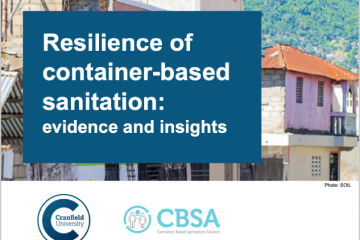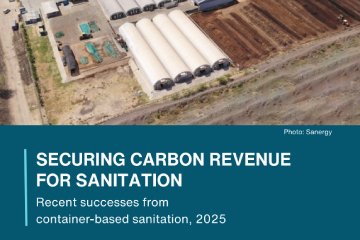This year’s UNC Water and Health Conference included several conversations exploring the value of CBS as an inclusive, efficient, and resilient solution, while also identifying areas where there is further work to do. Isabella Montgomery, CBSA’s Programme Manager, shares some take aways.
CBS shows that market-based solutions can be pro-poor but may require subsidy
The week kicked off with a discussion convened by RTI, USAID, Fresh Life, and iDE on whether market-based solutions can be pro-poor. The session was key to highlighting differing understanding of terminology and that market-based solutions can be seen as distinct from fully commercial solutions.
Isn’t market-based always profit-driven? How would the market be incentivised to reach low-income households? How can sanitation services serving these communities possibly recover all their costs while remaining safely managed?
Along with presentations from RTI and iDE, Ruthie Rosenberg (Fresh Life / Citywise) highlighted how the improving conditions for low-income communities is the driving force behind Fresh Life’s CBS service in Kenya, which operates like a business focusing customers and charging affordable user fees. However, she also highlighted that, despite customer willingness to pay and high rates of satisfaction, to ensure services remain affordable, financial sustainability of the service hinges on government partnerships and subsidy.
As such, Fresh Life’s service shows that market based solutions can be pro-poor but may require subsidy, particularly if they provide a public good and ‘positive externalities’ (economist speak for benefits!) from everyone having access, such as with safe sanitation. This has also been highlighted in recent reports by Cewas and Spring Impact.
The market-based approach is not inherent to CBS services. Globally, they are provided both as free public services, such as in Cape Town, South Africa, and through social enterprise (market-based) models such as Fresh Life. Both approaches can have their pros and cons, and, when managed well, public contracting of market-based CBS services can bring efficiencies for authorities while helping them to deliver services in hard to reach areas.
This is why Fresh Life and other CBS providers are increasingly collaborating with utilities, reducing their costs while ensuring safe waste management. These partnerships illustrate how CBS models can integrate into public systems to support universal sanitation coverage. This is key to how the Alliance envisions CBS to scale and underpins our current strategy and the rationale for developing our recent guide to mainstreaming CBS for authorities.
“Just because you’re using a market-based approach doesn’t mean it can’t include subsidies. I love market-based and pro-poor initiatives that fully fund themselves, when possible, but some market-based approaches also require subsidies.”
Louis Boorstin, Osprey Foundation
Vulnerable groups value CBS though continued efforts are needed to address their unique needs
On Wednesday, Dani Barrington of The University of Western Australia presented some of the emerging findings on intersectional experiences from the Scaling Offgrid Sanitation project, a £1.7 million UKRI-GCRF which aimed to critically examine the potential CBS has for addressing sanitation, particularly in urban areas featuring off-grid options for sanitation and hard-to-reach informal settlements. Dani presented the findings from work that specifically examined the experiences of vulnerable groups to see whether the most vulnerable users of CBS had an improved sanitation experience compared to those using other options.
Using a participatory methodology called PhotoVoice, participants were trained to take photos to capture the impact of sanitation on their daily lives. They then selected their favourite photos and wrote captions to share their experiences in interviews and public exhibitions.
The exercise revealed that vulnerable groups value CBS as a convenient and safe option. Residents shared how the service improves their daily lives but also identified some gaps – including challenges around accessibility for some renters, a desire to manage grey- and washer- water and some residents’ needs for sturdier toilet and a superstructure. Efforts are underway to address these gaps, including through partnerships between local governments and researchers. In South Africa, exhibitions and a photo essay given to the Mayor of Cape Town, have sparked a productive collaboration to review CBS servicing and improve implementation.

There is building recognition for CBS as a climate resilient approach and more research is needed on this emerging area
On Thursday, Winnie Felix-Jean presented SOIL’s approach climate resilience in a packed session co-convened by the Climate Resilient Sanitation Coalition, a group of over 30 organisations that is galvanising action on this topic. Winnie’s presentation provided a stark picture of the challenges of providing safely managed sanitation in flood-prone Cap Haitien where SOIL operates and the wider mountainous terrain of Haiti where widespread deforestation exacerbates climate events.
CBS’s adaptability ensures resilience in emergencies – with sealed waste containers preventing contamination during floods, and proactive communication via SMS and radio. Like many CBS providers, SOIL also operates a circular system which not only safely manages waste but converting waste into agricultural compost to mitigate climate impacts by reducing greenhouse gas emissions.
The growing recognition of CBS as a climate-resilient solution is an exciting development. However, the session also highlighted that more research is needed to formalise evidence and build a stronger case for adaptation approaches in sanitation, where much of the existing the evidence which is still often informal and anecdotal.
Watch From ideas to action – climate-smart sanitation on YouTube
Read SOIL’s blog, SOIL takes the stage at UNC’s Water and Health Conference

CBS learning rippling through the wider sector
A key area that CBSA members pride themselves on it their safe, professional services in a sector that is still largely informal and dangerous for workers, and there is much that can be leveraged for the wider sector. Sanivation is one of the providers leading the charge on this area through the consultancy services it offers to local government and utilities through which it shares good practices from container-based sanitation. As part of a session looking at improving WASH services in settings where communities gather (such as markets, schools and places of worship), Naomi Korir shared how Sanivation adapted the standards operating protocols (SOPs) from Fresh Life’s CBS service to improve the management of shared sanitation facilities in Kisumu, Kenya. The training including effective PPE as well as cleaning and disinfection procedures. Sanivation is now looking at scaling up the use of the SOPs through partnerships in other settings.



